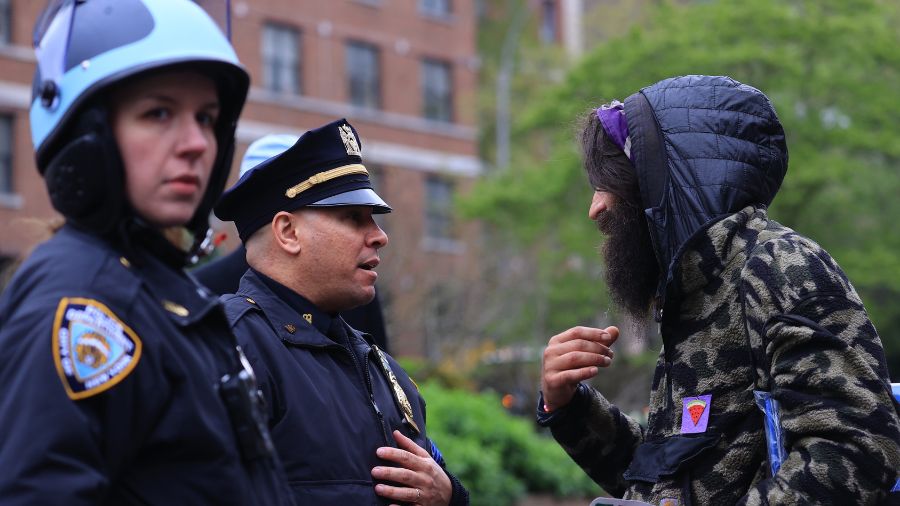Rantz: Seattle blood donations dangerously low thanks to surge of gun violence
Aug 24, 2022, 6:10 PM | Updated: Aug 25, 2022, 10:17 am

Andrea Goldstein speaks with medical assistant, Alex Kures, while donating blood alongside Karen Gielen (R) at Bloodworks Northwest on March 17, 2020 in Seattle, Washington. (Photo by Karen Ducey/Getty Images)
(Photo by Karen Ducey/Getty Images)
Bloodworks Northwest says it’s running dangerously low on blood and platelet donations ahead of Labor Day. One reason it’s low is Seattle’s surge in gun violence.
The nonprofit is sounding the alarms after it claims it’s “running on fumes” due to an unusually short supply of blood donations. Donations have been down all summer, leading to roughly 3,600 open appointments between now and Labor Day.
“We fear the rise [of] gun violence will further deplete the supply, and specific instances of gun violence are impacting the supply,” Bloodworks Northwest spokesperson Karen Kirby told the Jason Rantz Show on KTTH.
Rantz: As crimes surge, King County to further legalize car theft, drug dealing, other felonies
Summer crime is a contributing factor
Gun violence has become too common in Seattle and King County.
“News reports show shootings in Seattle are increasing. Earlier this month, our region experienced six separate shootings in one weekend.” Kirby explained to the Jason Rantz Show on KTTH. “If we suddenly have multiple gunshot wound victims who might need multiple units of blood each, then you can see how that impact grows on the blood supply. This underscores the importance of having a safe and reliable blood supply at all times for emergencies and other medical needs like cancer treatments.”
Through June, there have been 42 gun homicide victims and 171 nonfatal shooting victims in King County, which reports gun crime statistics each quarter.
The city of Seattle, which reports statistics separately, has already experienced 40 homicides and is close to exceeding last year’s homicide rate of 43. Of the 40 murders, 31 were reported as connected to gun violence, with 353 gunshots reported through June, according to the Seattle Times.
Rantz: Anti-cop, pro-criminal politicians rush to back Leesa Manion for KC Prosecutor
How much is this already impacting the region?
To this point, the region has been able to handle the surge of violence, at least as it relates to blood donations.
Harborview Medical Center, which sees the bulk of serious injuries in the region, navigated through last weekend’s shootings. But Dr. John Hess, who manages the blood supply at the hospital, remains on alert for a possible crisis.
“Fortunately, the recent local shootings did not affect our ability to manage the hospital’s blood supply.” Dr. Hess explained to KTTH Radio. “We gave 50 total products to five patients and were able to restock from local resources immediately. Keeping it that way as we head into the Labor Day weekend remains important. Bad things can happen at any time, and it is the blood on the shelf that saves lives.”
With the certainty of continued gun violence, at least in the short term, there’s an urgent push for more donations.
Type O shortage
Bloodworks Northwest is especially concerned about the blood supply because it’s part of the Blood Emergency Readiness Corps (BERC).
The BERC is a group of blood donation centers that come together during tragedies that require outside help. A spokesperson for Bloodworks Northwest said the BERC was last activated due to the mass shooting in Uvalde, Texas.
“[W]e are on-call every three weeks to ship blood anywhere in the U.S. that experiences a mass trauma events,” the spokesperson said.
The next time it’s on call is August 29 through September 4. Kirby is now especially concerned “given the Labor Day shortage of Type O blood we’re currently experiencing locally and across the nation.”
Donation fatigue
While gun violence isn’t the only reason for a potentially catastrophic blood shortage, it can make the precarious situation worse. More troublesome is the donation fatigue.
Bloodworks Northwest is frequently citing problems with the blood supply. They’ve previously blamed COVID. The problem with their constant pleas for blood donation is donor fatigue can hit hard. Even worse, the public may think it’s the equivalent of the “boy who cried wolf.”
It can be hard to counter this perception to the extent it may exist. With the seemingly endless gun violence in the region, the last thing Bloodworks Northwest needs is possible donors not understanding the urgency.
Listen to the Jason Rantz Show weekday afternoons from 3–6 pm on KTTH 770 AM (HD Radio 97.3 FM HD-Channel 3). Subscribe to the podcast here. Follow @JasonRantz on Twitter, Instagram, and Facebook. Check back frequently for more news and analysis.














